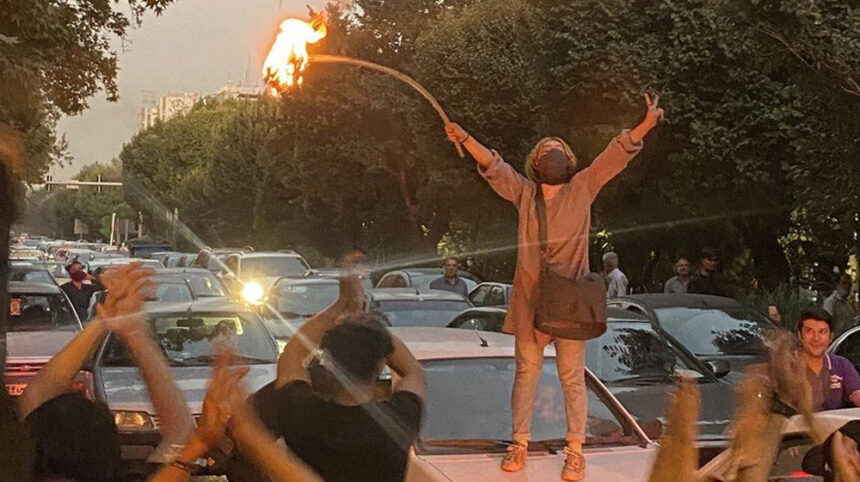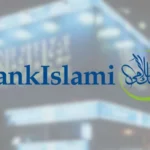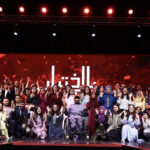On Tuesday, the fifth day in a row of troubles, women burned their hijabs on a bonfire in Sari. The crowds cheered. Activists say that security forces shot and killed three protesters in Urmia, Piranshahr, and Kermanshah. One of them was a woman. The government said that two civilians in Kermanshah and a police assistant in Shiraz were killed by protesters.
These women in #Iran’s northern city of Sari are dancing and burning their headscarves… anti-regime protests have now spread to dozens of cities from north to south, east to west… all triggered by the death of #MahsaAmini while in the custody of Iran’s morality police. pic.twitter.com/BBDvgC5L1w
— Rana Rahimpour (@ranarahimpour) September 20, 2022
At least seven people have been killed since the protests against the hijab laws and morality police began after Mahsa Amini’s death. The Kurdish woman from the city of Saqez in the north-west died in the hospital on Friday after being in a coma for three days. She was 22 years old.
She was in Tehran with her brother when she was arrested by the morality police. They said she broke the law that says women should cover their hair with a hijab and their arms and legs with loose clothing. She went into a coma soon after she passed out at a detention center.
Acting UN High Commissioner for Human Rights Nada al-Nashif said that there were reports that police hit Ms. Amini in the head with a baton and banged her head against one of their cars. The police have said that she had “sudden heart failure” and that she was not mistreated. But she was fit and healthy, according to her family.
“The tragic death of Mahsa Amini and the claims of torture and bad treatment must be looked into quickly, fairly, and thoroughly by an independent, competent authority,” Ms. Nashif said. “This will make sure that her family has access to justice and the truth.”
She said that the UN had received “many verified videos of violent treatment of women” as morality police increased their street patrols in recent months to crack down on people who were thought to be wearing “loose hijab.”
Unprecedented scenes in Iran: woman sits on top of utility box and cuts her hair in main square in Kerman to protest death of Mahsa Amini after her arrest by the morality police. People clap their hands and chant “Death to the dictator.” #مهسا_امینی pic.twitter.com/2oyuKV80Ac
— Golnaz Esfandiari (@GEsfandiari) September 20, 2022
“The government must stop going after, harassing, and jailing women who don’t follow the hijab rules,” she said, calling for the rules to be changed.
An aide to Iran’s Supreme Leader, Ayatollah Ali Khamenei, visited Ms. Amini’s family on Monday and told them that “all institutions will take action to defend the rights that were violated,” according to state media.
Senior MP Jalal Rashidi Koochi spoke out against the morality police in public, calling them a “mistake” that had only caused “loss and damage” for Iran.
What do the hijab laws in Iran say?
After the 1979 Islamic Revolution in Iran, the government made it mandatory for all women to wear a headscarf and loose-fitting clothes that hide their bodies when they go out in public.
The morality police, whose official name is “Gasht-e Ershad” (Guidance Patrols), are in charge of making sure women wear what the government thinks is “proper” clothing. Officers can stop women and check to see if their hair is showing too much, if their pants or coats are too short or tight, or if they have on too much makeup. If you break the rules, you could get a fine, go to jail, or get flogged.
As part of an online protest called “My Stealthy Freedom,” which started in 2014, Iranian women started sharing photos and videos of themselves breaking the hijab laws in public. Since then, “White Wednesdays” and “Girls of Revolution Street” have been started because of it.
Ms. Nashif was also worried about “the reported use of force that was unnecessary or disproportionate” against the thousands of people who have joined protests since Mahsa Amini’s death.
Hengaw, an organisation based in Norway that monitors human rights in mostly Kurdish parts of Iran, said that security forces shot and killed a 16-year-old boy and a 23-year-old man on Tuesday night in the cities of Piranshahr and Urmia, both in the province of West Azerbaijan.
The group also said that at a protest in the nearby province of Kermanshah, security forces shot and killed a woman.
Hengaw says that three male protesters were killed by security forces in Kurdistan province on Monday. One of them was killed in Ms. Amini’s hometown of Saqez, and the other two were killed in Divandarreh and Dehgolan. It said that another man who was shot in Divandarreh that day died from his wounds on Wednesday.
Authorities haven’t confirmed these deaths, but a prosecutor in the city of Kermanshah told the Tasnim news agency that “anti-revolutionary elements” killed two people on Tuesday.
The state-run Irna news agency said that a police assistant who was hurt in violent clashes with protesters in the city of Shiraz in the south on Tuesday died from his injuries.
In Tehran, videos of women taking off their headscarves and shouting “death to the dictator” (a phrase often used to refer to the Supreme Leader) were posted online. Others yelled, “Justice, freedom, no to forced hijab!”
A woman who took part in a protest on Monday in the city of Rasht in the north sent BBC Persian photos of what she said were bruises she got from being hit with batons and hoses by riot police.
“Police kept shooting tear gas. She said, “Our eyes were burning.” “We were trying to escape, but they put me in a corner and beat me. They called me a prostitute and said I was selling myself on the street.
Ali Hamedani from the BBC spoke to another woman who protested in the central city of Isfahan. She said, “While we were waving our headscarves in the sky, it made me feel so emotional to be surrounded and protected by other men.” It’s great to see everyone getting along. I hope everyone helps us.
Tehran Governor Mohsen Mansouri wrote on Twitter on Tuesday that the protests were “fully planned to cause trouble,” and state TV said that Kurdish separatists and critics of the government were using Ms. Amini’s death as an “excuse.”







